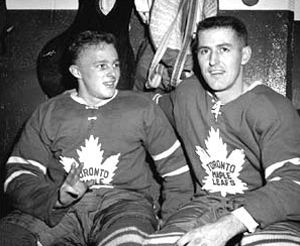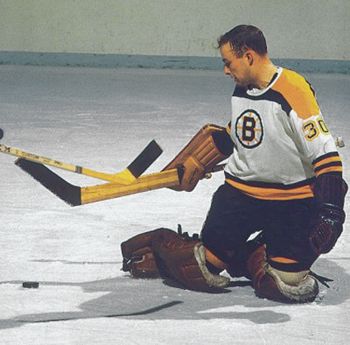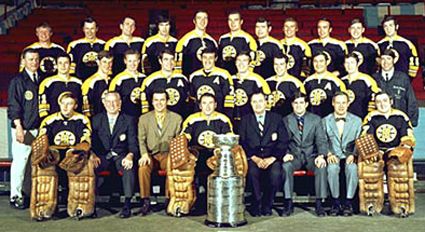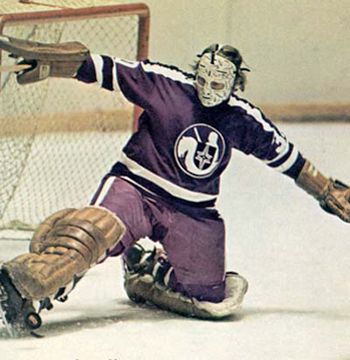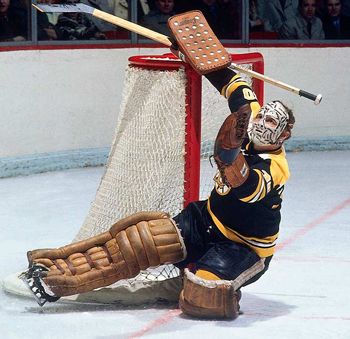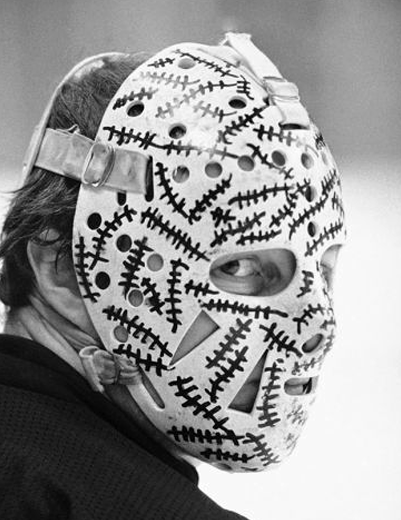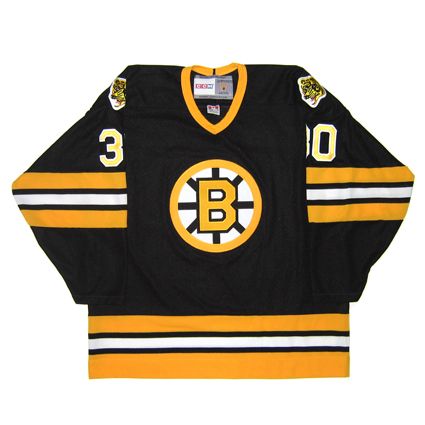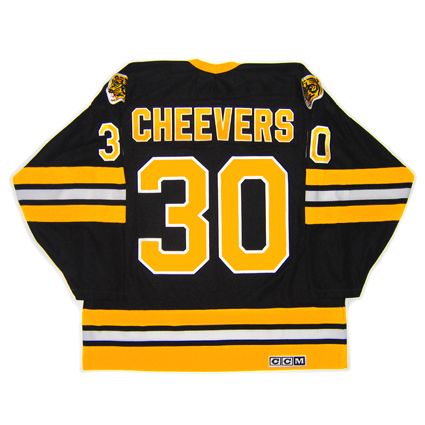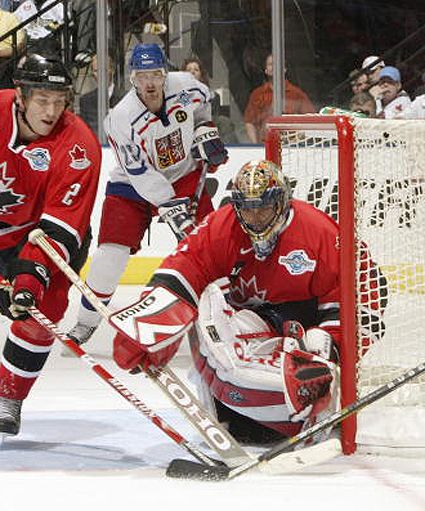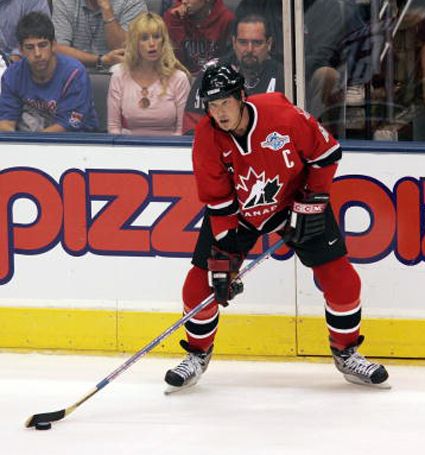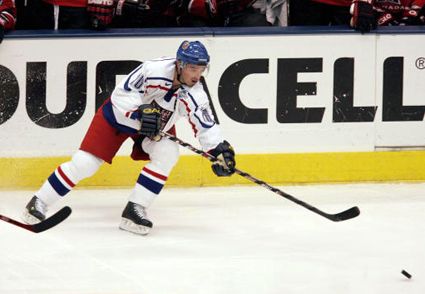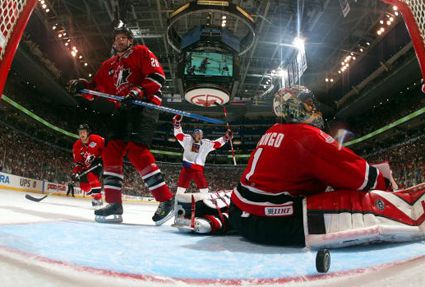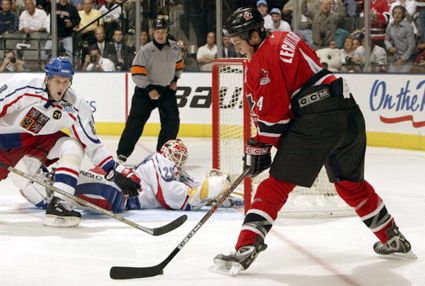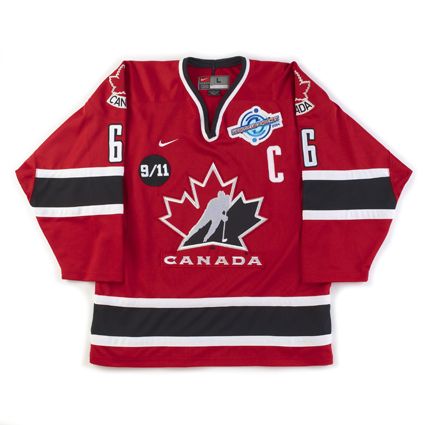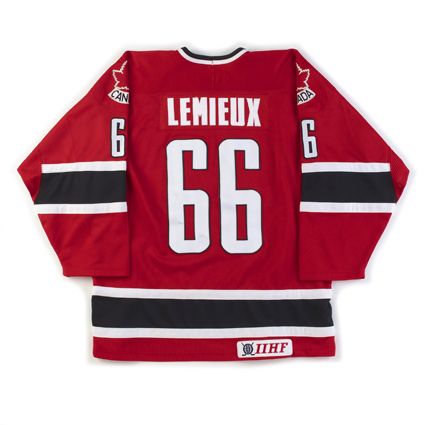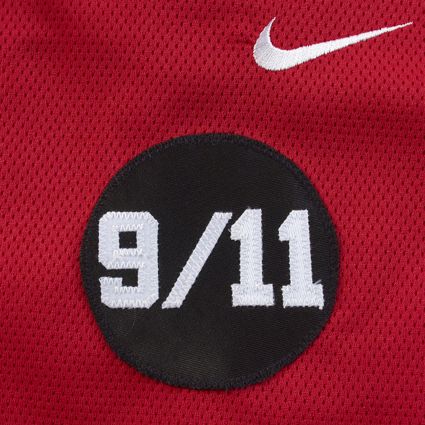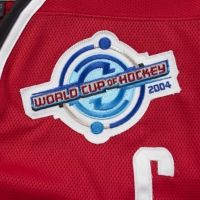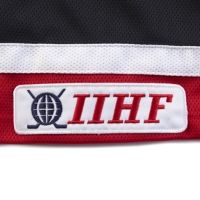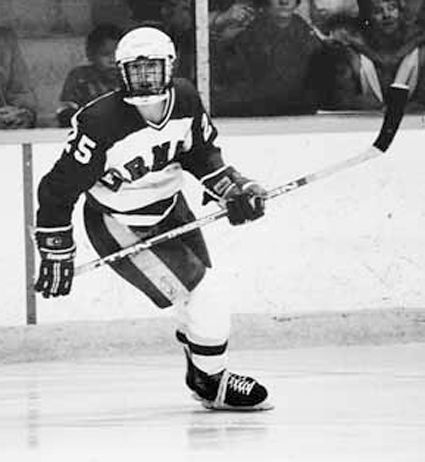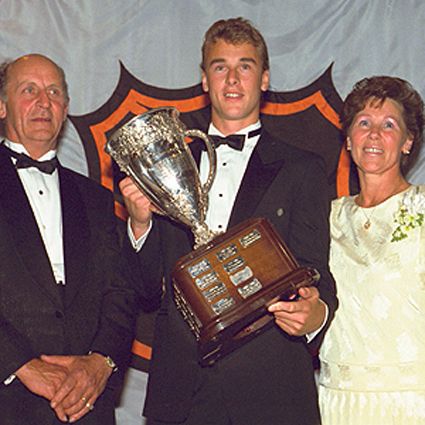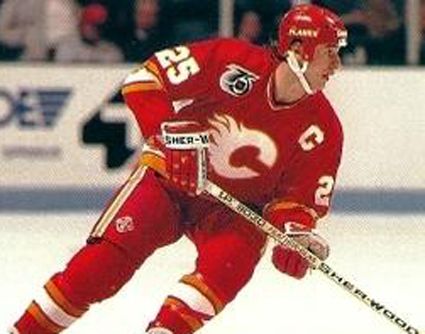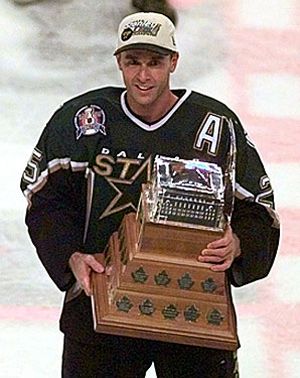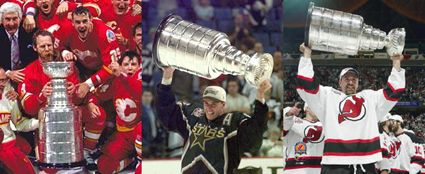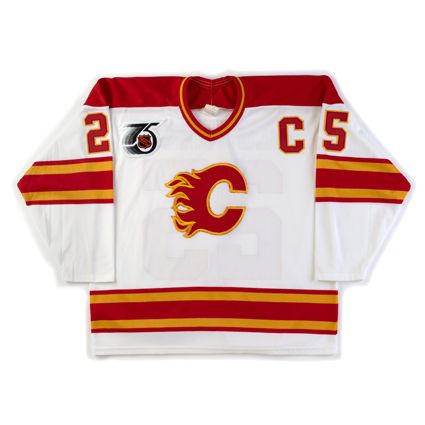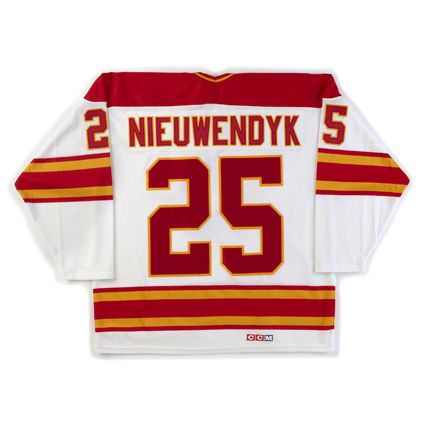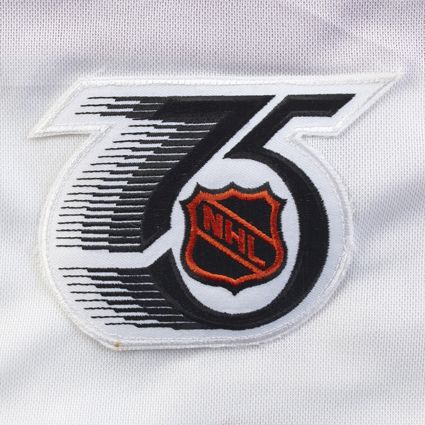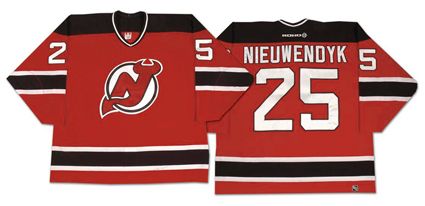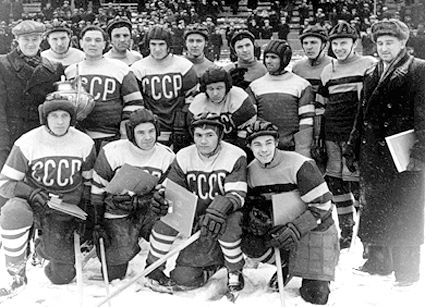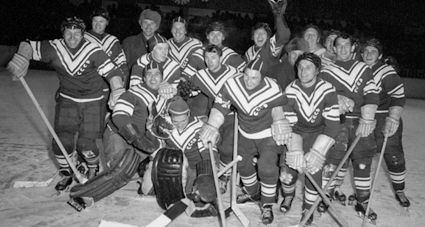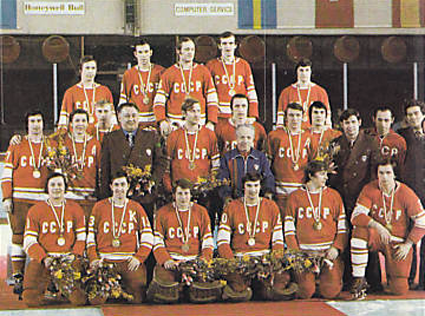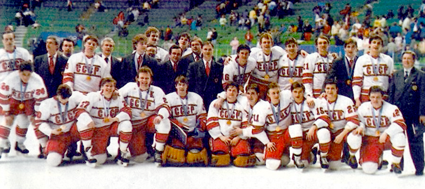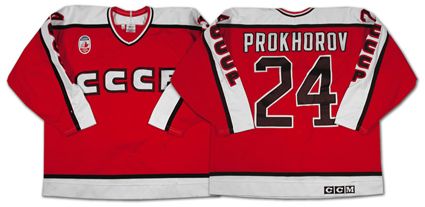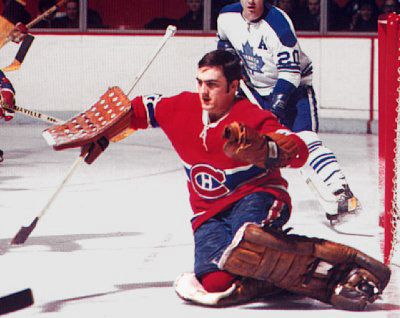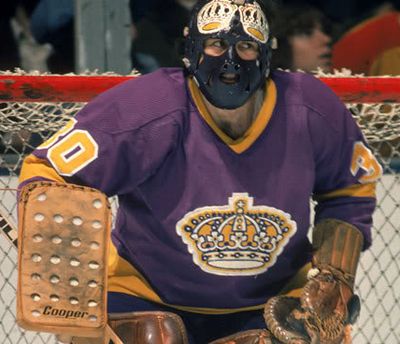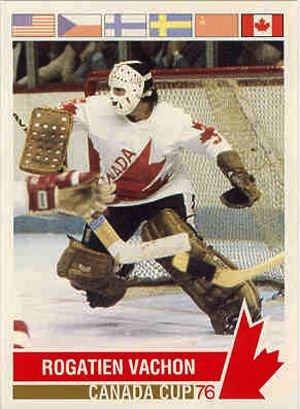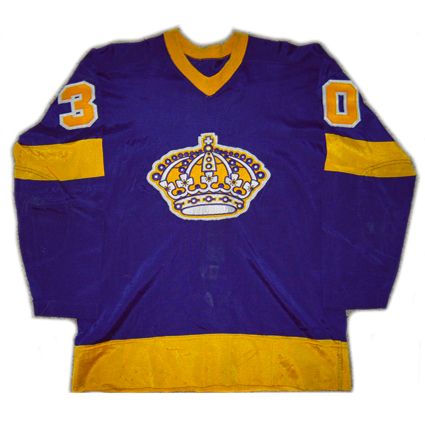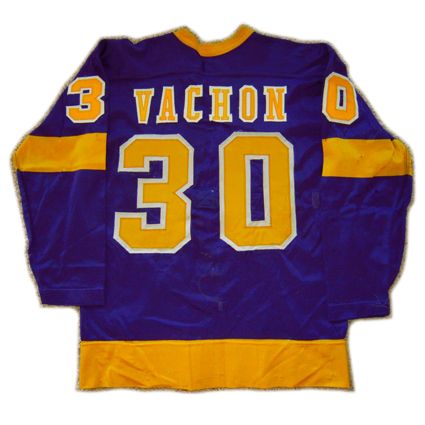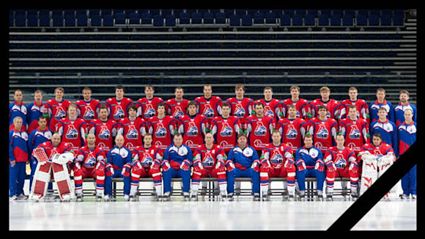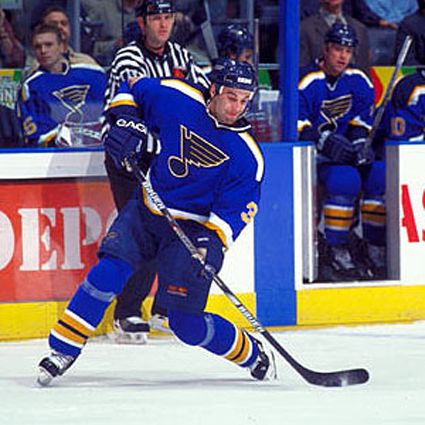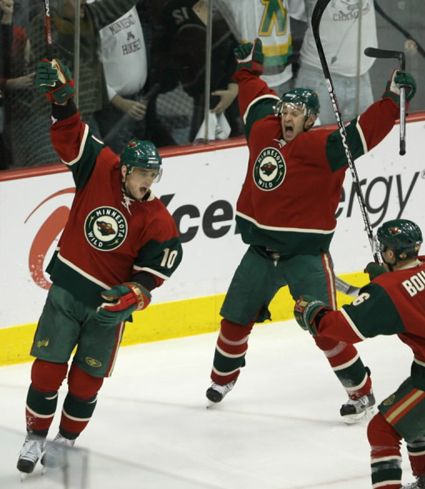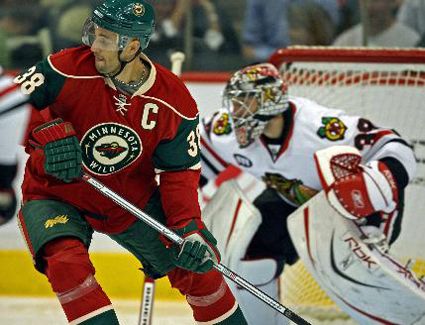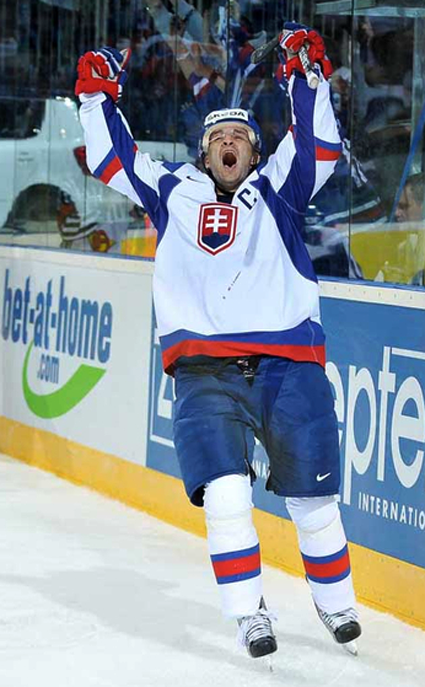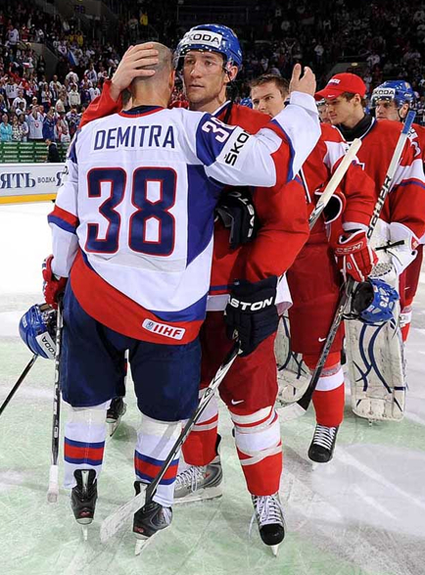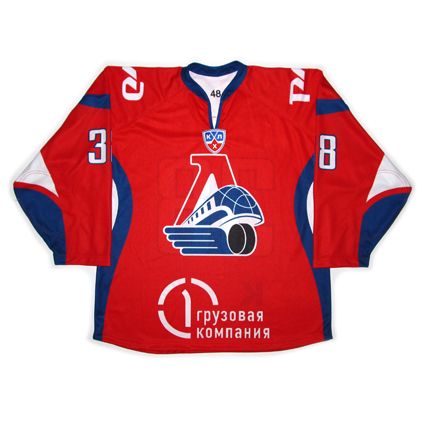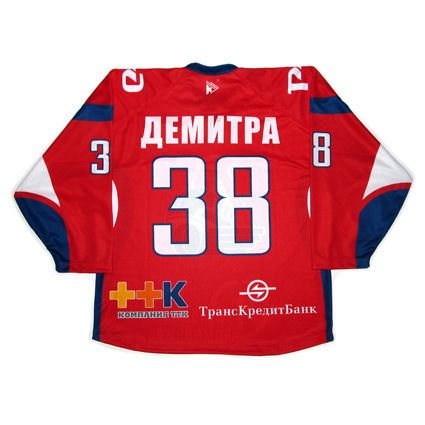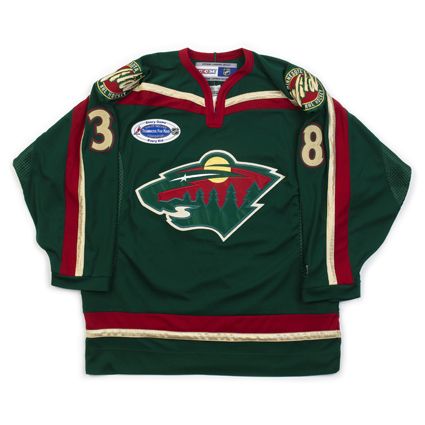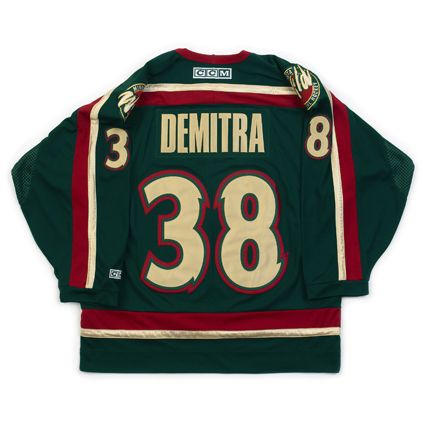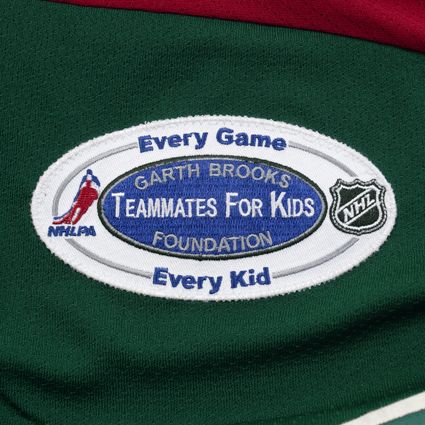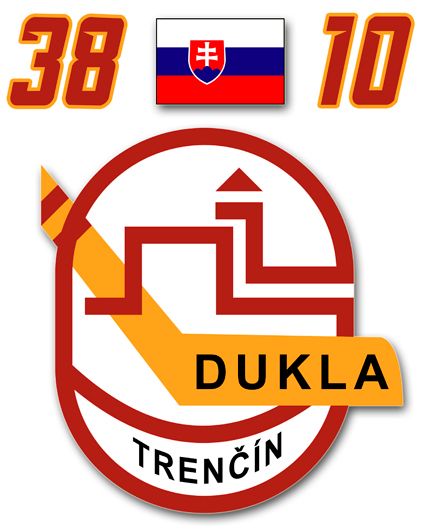Friday, September 12, 2014
1979-80 Boston Bruins Gerry Cheevers Jersey
Gerry Cheevers was a colorful character in an era filled with colorful characters and he ushered in an even more colorful era in hockey history - and did so in black and white.
Cheevers, who was inducted into the Hockey Hall of Fame on this date in 1985, first broke into the NHL with the Toronto Maple Leafs for two games as an injury replacement in the 1961-62 season.
Gerry Cheevers after his NHL debut with Billy Harris,
who had a hat trick in the Maple Leafs 6-4 victory
Unable to crack the Toronto lineup, mainly due to the presence of future Hall of Famer Johnny Bower, he spent the majority of the next four seasons with the Rochester Americans of the American Hockey League, where he set a single season record with 48 wins in 1964-65 which still stands today. In the playoffs that season, Cheevers led the Amerks to the Calder Cup championship.
He moved to the Oklahoma City Blazers in 1965-66 and also made his Boston Bruins debut with seven games, but failed to impress with an 0-4-1 record.
The following season Cheevers split time between the Blazers and Bruins and saw action in 22 games before taking over as the Bruins number one goaltender in 1967-68 just as the lowly Bruins were gearing up to dominate the league with both Bobby Orr and Phil Esposito now in the fold as well.
After playing an NHL career high 52 games and posting a record of 24-8-8 in 1969-70, Cheevers backstopped the Bruins to the 1970 Stanley Cup by going 12-1 in 13 playoff games.
The 1969-70 Stanley Cup champion Boston Bruins
In 1971-72 Cheevers set another record when he went undefeated in 32 consecutive starts (24-0-8), a record which has never been equalled. His final record for the season stood at 27-5-8 and in eight playoff games he won six and lost two as the Bruins again captured the Stanley Cup.
Despite the success the high flying Bruins were enjoying at the time, Cheevers accepted a lucrative $1.4 million offer to join the Cleveland Crusaders of the fledgling World Hockey Association for the 1972-73 season. His workload dramatically increased in Cleveland, rising from an average of 40 games with Boston the three previous seasons to 54 for the next three years in Cleveland.
Following his second season in the WHA, Cheevers was selected to play for Team Canada in the 1974 Summit Series against the Soviet Union for his first taste of international hockey. In a series dominated by the Soviets, Cheevers went 1-3-3 and was in goal for the only Canadian victory of the series.
After another season an a half in Cleveland, Cheevers asked to be bought out of his contract midway through the 1975-76 campaign and immediately returned to the Bruins.
Still in top form, Cheevers played another four seasons with a high of 30 wins in 1976-77 and was named to the Team Canada roster for the 1976 Canada Cup and the NHL All-Star team which faced the Soviet Union in the 1979 Challenge Cup before wrapping up his playing career following the 1979-80 season.
In all, Cheevers won 230 games in the NHL and 79 while in the WHA for 309 career victories.
Never one to embrace practice, Cheevers was hit by a puck one day and used it as an excuse to beat a hasty retreat to the dressing room. He relates, "I was trying to get out of practice one day when this shot that couldn't have broken an egg hit me in the mask. I faked a serious injury and went into the dressing room. I was sitting there having a Coke when [Bruins head coach] Harry Sinden came in and told me to get back out onto the ice. All the guys were laughing, so I knew I had to do something. I told the trainer to paint a 30-stitch gash on the mask. Then I went out and told Harry, See how bad it is!"
From then on, whenever Cheevers took a puck to the head, Frosty Forristall, the Bruins trainer, would calculate where the impact took place and how many stitches it would have resulted in, giving rise to the colorful era of the decorated goalie mask with his iconic black and white design.
Cheevers was elected to the Hockey Hall of Fame in 1985, where his ground breaking mask also resides.
Today's featured jersey is a 1979-80 Boston Bruins Gerry Cheevers jersey. The origins of this design can be traced back to 1967, a design which was simplified in 1974 when the yellow shoulders and lace-up collar disappeared. The secondary logos were added to the shoulders in 1976 and the names on the back arrived one year later. The jersey would remain unchanged through the 1994-95 season.
Today's video segment begins with his profile from the excellent Legends of Hockey series.
Next, a profile of Cheevers from his days in the World Hockey Association with the Cleveland Crusaders.
Finally, a tribute song to Gerry Cheevers from the band Chixdiggit.
Labels:
Boston Bruins,
Cheevers Gerry
Thursday, September 11, 2014
2004 Team Canada Mario Lemieux Jersey
The 2004 World Cup of Hockey continued on this date when Canada would took on the Czech Republic in a Semifinal matchup on September 11th, 2004 at the Air Canada Centre in Toronto, Canada.
The Canadians had throttled Slovakia 5-0 to reach the Semi-Finals, while the Czech Republic dominated Sweden 6-1 in their Quarterfinal contest.
The first period of this thriller was a goaltending duel between Roberto Luongo, who made seven saves, and his Czech counterpart Tomas Vokoun, who stopped ten Canadian shots on goal.
Defenseman Eric Brewer opened the scoring at 11:15 of the second with assists from Joe Thornton and Kris Draper, followed by Canadian captain Mario Lemieux increasing the lead for Canada on the power play at 14:25 from Brad Richards and Vincent Lecavalier.
Canadian goaltender Roberto Luongo
Defenseman Eric Brewer opened the scoring at 11:15 of the second with assists from Joe Thornton and Kris Draper, followed by Canadian captain Mario Lemieux increasing the lead for Canada on the power play at 14:25 from Brad Richards and Vincent Lecavalier.
Petr Cajanek responded for the Czechs just 42 seconds later with assists from Milan Hejduk and Martin Rucinsky. The period would end with the score at 2-1 for Canada.
Martin Havlat would tie the game at 7:21 of the third on the power play with the assists going to Tomas Kaberle and Hejduk. The Canadian fans would still be celebrating Draper's go-ahead goal, from Thornton, at 13:47 when Patrik Elias would tie the game once more with a goal a mere six seconds later from Havlat.
The remainder of the third period would be played scoreless, sending the game, and the opportunity to play in the final, into sudden death overtime.
Elias celebrates his lighting fast Czech counterpunch goal
The remainder of the third period would be played scoreless, sending the game, and the opportunity to play in the final, into sudden death overtime.
The determined Czechs would create the first five shots on goal before Lecavalier would win the game on the first Canadian shot of the overtime from a nearly impossible angle at the 3:45 mark from Ryan Smyth to send the home fans into rapture as Canada secured their spot in the championship game, also to be played on home ice in Toronto.
Today's featured jersey is a 2004 Team Canada Mario Lemieux jersey as worn on September 11th, 2004. This style jersey first appeared at the 2002 Olympics in Salt Lake City and was worn by Canada through an unparalleled period of success though the 2005 World Championships, as the Canadians won Olympic gold in 2002, the World Championships in 2003 and 2004, the 2004 World Cup of Hockey, the World Junior Championships in 2005, the World U18 World Championships in 2003, the Women's Olympic gold in 2002 and the Women's World Championships in 2004.
At one point, Canada were Men's and Women's Olympic champions, holders of the World Cup, Men's and Women's World Champions and U20 World Champions all at the same time, which prompted them to make a special edition of this jersey with gold trim around the Hockey Canada maple leaf crest.
At one point, Canada were Men's and Women's Olympic champions, holders of the World Cup, Men's and Women's World Champions and U20 World Champions all at the same time, which prompted them to make a special edition of this jersey with gold trim around the Hockey Canada maple leaf crest.
The jersey features Lemieux's captain's "C", the 2004 World Cup of Hockey logo patch as well as a 9/11 memorial patch on the right chest, which was worn only by Canada and just for that game in recognition of the third anniversary of the terrorist attacks in New York City in 2001.
Finally, this muti-patched jersey has the International Ice Hockey Federation patch on the back.
Finally, this muti-patched jersey has the International Ice Hockey Federation patch on the back.
Today's video section consists of the highlights of the thrilling 2004 World Cup Semifinal game between Canada and the Czech Republic on this date in 2004.
Labels:
2004 World Cup of Hockey,
Canada,
Lemieux Mario
Wednesday, September 10, 2014
1991-92 Calgary Flames Joe Nieuwendyk Jersey
Born on this date in 1966, Joe Nieuwendyk played three years at Cornell University in the Eastern Collegiate Athletic Conference (ECAC), where he was named an All-American in 1986 and 1987.
He would then move onto the NHL, making his debut with the Calgary Flames, who had drafted him 27th overall in 1985. Because he played less than 25 games, he was still considered to be a rookie the following season when he scored 51 goals and was awarded the Calder Trophy.
He would match is 51 goal total the following season as the Flames would capture the Stanley Cup. Nieuwendyk would contribute 10 goals and 4 assists in 22 games during that year's playoffs.
His goal scoring would remain consistently high, as he netted 45 in each of the next two seasons, giving him a 48 goal average in his first four NHL seasons, never scoring below 45 goals in the process. He would also average 88.5 points during that time span, with his career high coming in 1989-90 when he would add 50 assists to his 45 goals for 95 points.
He became the Flames captain in 1991 was named the winner of the King Clancy Memorial Trophy in 1995, given to the player who best exemplifies leadership qualities on and off the ice and who has made a significant humanitarian contribution to his community.
Nieuwendyk would play in 9 seasons in Calgary before being dealt in 1995 to the Dallas Stars where he would play for seven seasons, with his best point total coming in 1997-98 when he would score 39 goals and 30 assists for 69 points.
Aside from personal best point totals, the highlight of Nieuwendyk's time in Dallas was capturing his second Stanley Cup and being named with winner of the Conn Smythe Trophy as the most valuable player in the 1999 playoffs.
Conn Smythe trophy winner Joe Nieuwendyk
Near the end of the 2001-02 season Joe would be dealt to the New Jersey Devils, where he would win his third Stanley Cup in 2003.
That victory would place Nieuwendyk in the unique position of having won the Stanley Cup three times in three different decades as a member of three different teams, with championships in Calgary in 1989, Dallas in 1999 and New Jersey in 2003.
His career would wind down with one season with the Toronto Maple Leafs before moving to the Florida Panthers for one full season and 15 games of a second before retiring with 564 goals and 562 assists for 1,126 points in 20 NHL seasons, placing him in the top 50 in NHL history at the time of his retirement.
In addition to his NHL career, Nieuwendyk would also play in tournaments for Canada on four occasions. in 1986 he would win silver at the World Junior Championship, he would participate at the World Championships in 1990 and play in the Olympics twice, first in 1998 in Nagano, Japan and then earn a gold medal in 2002 in Salt Lake City.
Today's featured jersey is a 1991-92 Calgary Flames Joe Nieuwendyk jersey. This jersey features the captain's "C" that Joe first wore that season along with the NHL 75th Anniversary patch worn by all the teams that season.
Today's featured jersey is a 1991-92 Calgary Flames Joe Nieuwendyk jersey. This jersey features the captain's "C" that Joe first wore that season along with the NHL 75th Anniversary patch worn by all the teams that season.
Calgary would continue to wear this style jersey through the 1993-94 season until it was replaced after 14 seasons.
Bonus jersey: Today's bonus jersey is a 2002-03 New Jersey Devils Joe Nieuwendyk jersey. This style of Devils jersey was adopted for the 1992-93 season when the Devils dropped the color green from their color set and has remained unchanged ever since. In addition, the Devils, led by team president and general manager Lou Lamoriello, have resisted the adaptation of an alternate jersey and if he has his way, the Devils will still be wearing this same jersey unchanged 100 years from now.
Here are some highlights of Joe and Flames winning the Stanley Cup in 1989.
Here Joe makes a really nice move around Kevin Weeks to score his 500th career goal in style.
Next is a retrospective of Joe's career from ESPN.
Here is a highlight reel of Nieuwendyk's time with the Dallas Stars, highlighting his goal scoring ability.
Labels:
Calgary Flames,
New Jersey Devils,
Nieuwendyk Joe
Tuesday, September 9, 2014
1991 Soviet Union Vitali Prokhorov Jersey
On this day in 1991 the end of an era arrived as the Soviet Union National Team played the final game in it's history.
The Soviets announced their arrival on the international hockey scene in fine style (while wearing blue jerseys!), taking the gold medal home from the 1954 World Championships in their first attempt. The Soviets had only started playing ice hockey in 1946 and stunned the hockey world with their 7-2 victory over Canada in the final.
After a silver medal in the 1955 World Championships, the Soviet Union claimed it's first Olympic gold medal in 1956 with a perfect 7-0 record.
After a string of silver and bronze medals from 1957 to 1961, the era of Soviet dominance swung into high gear with ten consecutive gold medals from 1963 to 1972, which included a trio of consecutive Olympic golds in 1964, 1968 and 1972. Their run was interrupted by a silver at the 1972 World Championships before reeling off another four straight from the 1973 World Championships to the 1976 Olympics.
Five more World Championship titles followed from 1978 to 1983 and their sixth Olympic gold in eight tries in 1984. The final chapter of the Soviet National team saw them win the World Championships in 1986, the Olympics in 1988 and their final two Worlds in 1989 and 1990, the last gold medal for the Soviet Union National Team.
With the political landscape at home undergoing a historic upheaval, the Soviet Union was unsure if they would even send a team to compete in the 1991 Canada Cup, but they eventually took part. Having suffered the loss of young star Alexander Mogilny to defection and players such as Slava Fetisov, Vyacheslav Bykov, Andrei Khomutov, Pavel Bure and Vladimir Konstantinov all unavailable due to commitments with professional clubs in the NHL and Europe, Evgeny Davydov left off the squad for refusing to sign a contract with the Red Army club team, and the refusal of Latvian goaltender Arturs Irbe to play for the Soviet National Team any further for personal political reasons, the Soviets did eventually decided to field a team just a few weeks before the tournament.
The Soviets set the tone for their tournament with an opening 5-2 loss to Czechoslovakia. A 3-2 loss to Sweden followed before showing signs of life when they pounded Finland 6-1. A 2-1 loss to the United States put their participation in peril.
With one playoff round berth remaining up for grabs, Czechoslovakia, Sweden and the Soviet Union were tied at 2 points apiece with a single game remaining. Before the Soviets could even take to the ice, Sweden defeated Czechoslovakia, knocking the Soviet Union out of the upcoming playoff round.
In their final game, the best they could hope for was to deny Canada the top seed going forward. Ravil Khaidarov scored for the Soviets at 3:13 of the first, but the period ended even when Canada scored at 14:47 on the power play.
Andrei Kovalenko scored unassisted at 7:46 followed but Canada's Bill Ranford stopped Vitali Prokhorov from converting a penalty shot less than a minute to give Canada a boost by keeping the score at 2-1.
Steve Larmer evened the score for Canada at 7:15 of the third following a penalty to Soviet goaltender Mikhail Shtalenkov. Alexander Semak put the Soviet Union back on top with under seven minutes to play, but Canada's Brent Sutter tied the game with 5:18 to play.
The game would remain tied at the end, giving Canada the top spot in the Round Robin stage and bring a quiet end to the history of the Soviet Union National Team following 37 years of excellence.
From 1954 to the 1991 Worlds, the Soviet Union took home a medal in every World Championship and Olympic Games, a streak of 39 out of 40. The only time they do not appear on the podium is 1962 when they did not participate due to international politics outside of the sporting world.
In addition to the World Championships and Olympics, the Soviets won the championship in 1981, placed second in 1987 and third in 1976, lost in the semifinal in 1984 in the first four Canada Cup tournaments.
Today's featured jersey is a 1991 Soviet National Team Vitali Prokhorov jersey. This style was a huge departure from the minimalist Soviet designs of the past. Prior to the 1991 Canada Cup, the vast majority of Soviet jerseys were simple red jerseys with a few basic white stripes and one color white numbers adorned with "CCCP" across the chest in a very basic font.
Just the addition of yellow accents and running the CCCP logo at an upwards diagonal by Tackla in the 1989 was considered flashy by Soviet standards.
The addition of the bold use of black, the stylized font used for the CCCP logo and the full length sleeve stripes made for an arresting look which seemed more at home in the NHL, while still retaining the intimidating look of The Big Red Machine, even if the team's roster had changed.
There was an early prototype of this jersey made with an even more arresting hammer and sickle logo, but that style was never used in competition but remains available in replica versions, and is in fact much more commonly found that the actual 1991 Canada Cup game worn version featured here.
Our video section today begins with a tribute to Soviet hockey history and their many successes.
Next, classic Soviet hockey footage is shown as Igor Larionov's daughters Alyonka and Diana sing Ave Maria prior to a legends game outdoors in Moscow's Red Square.
Labels:
1991 Canada Cup,
Soviet Union
Monday, September 8, 2014
1971-72 Los Angeles Kings Rogie Vachon Jersey
Born on this date in 1945, Rogatien "Rogie" Vachon followed the usual pattern at the time of first playing for the Montreal Junior Canadiens, then moving to the Quebec Aces of the AHL. He then made the trek down to Houston to play with the Apollos of the CHL prior to joining the Montreal Canadiens, making his NHL debut in the 1966-67 season with 19 games and an impressive 11-3-4 record with a 2.48 goals against average.
With goaltender Charlie Hodge gone due to the expansion of the NHL from six teams to 12, Vachon split the starting duties for the 1967-68 season with Lorne "Gump" Worsley. The duo shared the Vezina Trophy, then awarded to the goaltenders of the team who allowed the fewest goals against each season. The Canadiens went on to capture the Stanley Cup that season, earning Vachon the first Stanely Cup ring of his career.
Vachon again split the goaltending duties with Worsley in 1968-69 and posted a 22-9-3 record for the powerhouse Canadiens during the regular season prior to leading Montreal to a second consecutive Stanley Cup by going 7-1 in eight playoff games.
He took the bulk of the workload in 1969-70, appearing in 64 games, winning 31. The following season Vachon teamed up with Phil Myre to return the Canadiens to the Stanley Cup championship, with Vachon getting his name on the Stanley Cup for the third time in four seasons.
After playing in just a single game for Montreal in 1971-72, Vachon was traded to the Los Angeles Kings for four players. The change from the defending champions to the lowly Kings had the expected impact on Vachon's statistics, as his record in 28 games for Los Angeles was 6-18-3 in 28 games and his goals against average went from 2.64 with Montreal to 4.05 with the Kings.
He became a workhorse in goal for the Kings over the next six seasons, playing at least 53 games and as many as 70. His win totals also increased to 22 in 1972-73 and then stayed consistently between 26 and 29 with one year reaching 33. 1974 saw the Kings reach the playoffs for the first of five consecutive seasons with Vachon in goal.
Vachon appeared in his first NHL All-Star Game in 1973 and again in 1975 and 1978. He was named the Kings Most Valuable Player in 1973, 1974, 1975 and 1977.
With his contract in Los Angeles at an end, Vachon signed with the Detroit Red Wings as a free agent for the 1978-79 season, where he would play for two years. During the summer of 1980, Vachon was traded to the Boston Bruins for the final two seasons of his career.
His final NHL totals show him playing 795 games, winning 355 and posting and final goals against average of 2.99 despite playing on some less than great teams early in Los Angeles and a pair of downright poor Red Wings teams.
Internationally, Vachon stood out in his only appearance for Team Canada, which came during the 1976 Canada Cup. His stellar play led to him playing in every game for Canada as he went 6-1 with a pair of shutouts and a 1.39 GAA in 7 games to lead Canada to the championship over Czechoslovakia on his way to being named the tournament's Most Valuable Player.
Vachon's #30 was the first number retired by the Kings on February 14, 1985.
Today's featured jersey is a 1970-71 Los Angeles Kings Rogie Vachon jersey. When the Kings jerseys were first introduced in the 1967-68 expansion year, the purple and gold colors were a shocking addition to the NHL's color palette of the day, as only the gold Bruins jerseys departed from the red, white, blue and black colors used by the other five Original Six clubs.
Additionally, the Kings gold jerseys were a unique departure, as all the other 11 teams in 1967-68 wore white jerseys at home.
In 1969 the Kings added white trim to their previously one color numbers. The following season names appeared on their gold jerseys and were occasionally used on the purple ones for games on television before becoming a permanent fixture in 1977.
This basic jersey style would remain in use from the Kings debut in 1967 through the end of the 1979-80 season.
Here is a video tribute to the 1976 Canada Cup Team Canada squad, which featured Vachon in goal. Everyone snap your fingers!
Here is a nice video feature on the players who have had their numbers retired by the Los Angeles Kings, which includes game footage of Vachon.
Labels:
Los Angeles Kings,
Vachon Rogie
Sunday, September 7, 2014
2010-11 Lokomotiv Yaroslavl Pavol Demitra Jersey
Today marks the third anniversary of the crash on takeoff of the jet carrying the Russian club Lokomotiv Yaroslavl to what was supposed to be their season opening game. The crash killed 43 of the 45 people on board, taking the lives of all but one of the players, Alexander Galimov, who succumbed to his injuries five days later, and all of the other team personnel on the flight. The only other survivor of the crash was a member of the plane's crew.
"At first we didn't want to believe it. But right now there is no hope. The team is gone," a Lokomotiv team official told the Russian news outlet Sovietsky Sport.
The catastrophe claimed the lives of players and coaches from Belarus, Canada, the Czech Republic, Germany, Latvia, Russia, Slovakia, Sweden and Ukraine, shaking the hockey community worldwide.
Among those familiar to fans of the NHL were assistant coach and 12 year NHL veteran and multiple Soviet and Russian league champion Russian Igor Korolev, eight year NHL veteran and World Championship gold medal winner Czech Karel Rachunek, Stanley Cup and World Championship gold medal winner Czech Josef Vasicek, 11 year NHL veteran, owner of the NHL's longest playing streak for a defenseman and Latvian National Team mainstay Karlis Skrastins, 12 year NHL veteran, World Championship gold medal winner and one of the first four Russians to have his name engraved on the Stanley Cup, assistant coach Alexander Karpovtsev, 14 year NHL veteran, with 917 games played, and Belarus National Team leader Ruslan Salei, 18 year NHL veteran of 1,222 games and Stanley Cup winner and team head coach Canadian Brad McCrimmon.
Russian Alexander Vasyunov had played two seasons with the Lowell Devils of the AHL and 18 games with the New Jersey Devils last season and German Robert Dietrich spent two seasons in North America in the Nashville Predators system with the AHL's Milwaukee Admirals,
Czech Jan Marek led the KHL in goal scoring in 2008-09 and was a World Championship gold medal winner in 2010. Sweden was hit hard by the loss of goaltender Stefan Liv, a three time Swedish Elitserien champion with HV71, and World Championship gold medal and Olympic gold medal champion, both coming in Sweden's historic double of 2006. The Polish born Liv also played in North America with the Grand Rapids Griffins of the AHL in 2006-07.
One of the highest profile names to perish in the crash was Slovak star Pavol Demitra. Demitra began his professional career with two seasons in the Czechoslovak league before moving to North America following his being drafted 227th overall by the Ottawa Senators. He would split three seasons between the NHL's senators and their top minor league affiliate, the Prince Edward Island Senators from 1993-94 to 1995-96.
Demitra played for the Las Vegas Thunder and Grand Rapids Griffins of the IHL as well as eight games with the St. Louis Blues following a trade. he found his greatest success with St. Louis, with three seasons of 35 goals or more, including a high of 37 in 1998-99, the year of his first NHL All-Star Game appearance. Two more All-Star appearances would follow in 2000 and 2002 before Demitra would set a career high in points with 93 in 2002-03, placing 6th overall in the league scoring race. In all, Demitra would lead St. Louis in scoring four times, in 1999, 2000, 2002 and 2003.
He would also be recognized with with the Lady Byng Trophy in 2000 after recording 28 goals and 75 points with just eight penalty minutes.
He returned to Slovakia during the NHL lockout of 2004-05 to once again play for Dukla Trencin. Once the NHL resumed play, the free agent Demitra signed to play for the Los Angeles Kings for one season prior to being traded to the Minnesota Wild to be teamed with fellow Slovak and close friend Marian Gaborik. for the 2006-07 and 2007-08 seasons.
Demitra tied for the team lead in scoring during his first season in Minnesota despite Gaborik missing nearly half the season due to injury. While with the Wild, Demitra served as team captain during October of 2007.
His final two NHL seasons were spent with the Vancouver Canucks, although the second was limited to 28 games following a lengthy recovery from off-season shoulder surgery.
His NHL career concluded with 847 games played, 304 goals and 464 points for 768 points. Additionally, in 94 career playoff games, Demitra scored 23 goals and 59 points.
For the 2010-11 season, Demitra signed with Lokomotiv of the KHL in Russia, where hisrenowned playmaking abilities made the veteran the club's leading scorer and placed him in a tied for third in league scoring.
Internationally, Demitra played in the 1992 European Junior Championships and the 1993 World Junior Championships, winning a bronze medal, for Czechoslovakia. Following the division of Czechoslovakia, Demitra skated for Slovakia in both the 1996 World Championships and 1996 World Cup, the 2002 Olympics and 2003 World Championships where he earned a bronze medal.
He then went on to participate in both the 2004 World Championships and 2004 World Cup, the 2005 World Championships, 2006 Winter Olympics and 2007 World Championships.
Demitra then led all players at the 2010 Olympics in scoring with ten points in seven games on his way to being named a tournament all-star. He also scored a sublime shootout goal to give Slovakia a win over Russia in the preliminary round.
His final international appearance was as the 2011 World Championships, where he had the honor of captaining the Slovak team on home ice.
Here, Demitra and future Lokomotiv teammate Rachunek embrace following their preliminary round game at the 2011 World Championships.
Demitra leaves behind his wife Maria and his two children, Lucas and Zara.
Today's featured jersey is a 2010-11 Lokomotiv Yaroslavl Pavol Demitra jersey as worn during Demitra's final season of play during which he scored 18 goals and 60 points in 54 games, which placed him fifth in league scoring. During the postseason, Demitra scored another 6 goals and 21 points for second in KHL playoff scoring.
The name Lokomotiv comes from the fact the club is owned by the Russian national railroad, Russian Railways. The club was founded back in 1959 and has won the Russian Open Championship three times (1997, 2002 and 2003), and were KHL runner's up twice (2008 and 2009) and were also runner's up in the 2003 IIHF Continental Cup.
Following the crash, the club fielded a team of young players in the VHL, the second level of Russian hockey, but will return to the KHL for the 2012-13 season, having signed NHL veterans Viktor Kozlov, Niklas Hagman, Staffan Kronwall, Curtis Sanford and Vitaly Vishnevsky to rebuild their roster in an attempt to return to their place among the top clubs in the KHL.
Bonus jersey: Today's bonus jersey is a 2006-07 Minnesota Wild Pavol Demitra jersey as worn on January 6, 2007 with the Garth Brooks Teammates for Kids Foundation patch. Each player on every team would wear the Teammates for Kids patch on their jerseys for a game that January, after which the jerseys were then auctioned off for charity to raise money for the foundation.
To date, the foundation has distributed over $75 million through it's various programs in conjunction with professional athletes.
Here is Demitra's game winning goal in the shootout against Russia in the 2010 Olympics, where he displayed his puck control by deftly lofting the puck over the Russian goaltender counter to the direction of his body following his patented "swing wide" approach to the net.
In Minsk, Lokomotiv's scheduled opponents for their first game, Dynamo Minsk, held a hockey funeral for those killed in the crash, a moving and emotional ceremony.
To see the full 35 minute version of the service, click here.
***********
On a personal note, we had the pleasure of seeing Demitra play in person for the two seasons he was with the Wild and the opportunity to meet him in person following a few practices. Our favorite memory of him began when we were at a pre-game warmup one night. A kid came down the steps of the arena toward the glass wearing a goaltenders catching glove while the players were warming up. As soon as the kind stopped and held up his glove, Demitra looked up after finishing a stick handling warmup drill and lofted the puck over the glass to the kid, who caught the puck in the glove and ran off.
We commented, "It was like he knew it was coming," to which the regulars replied, "He did, Pavol always looks for a kid to give a puck to."
Armed with that knowledge, the next time we attended a game with our youngster, we did all we could to put ourselves in position to get Demitra's attention. Wearing a vibrant yellow Dukla Trencin jersey, Demitra's previous Slovak club of which he was then a part-owner, to stand out against the dark green seats of the Xcel Energy Center, and with our youngster not only dressed in a Wild jersey, but holding a Dukla Trencin sign with Demitra and Gaborik's numbers 38 and 10 to further stand out, we positioned ourselves alone six rows up to make any attempt to loft a puck to us easier than if we were right behind the glass in the first couple of rows, not to mention away from the larger number of fans at the glass.
As Demitra finished his stickhandling drill, he looked up to scan the crowd for a kid, we gave him a quick "over here!" wave, as if we needed to wearing the bright yellow of Dukla, and he softly floated the puck over the glass right to us, which landed more gently in our hands than one could ever imagine.
We repeated this later in the season, and those two seemingly ordinary warmup pucks now hold an even more special place in our modest collection of memorabilia now that Demitra and his many Lokomotiv teammates have now left us.
Labels:
Demitra Pavol,
Lokomotiv Yaroslavl,
Minnesota Wild
Subscribe to:
Comments (Atom)

